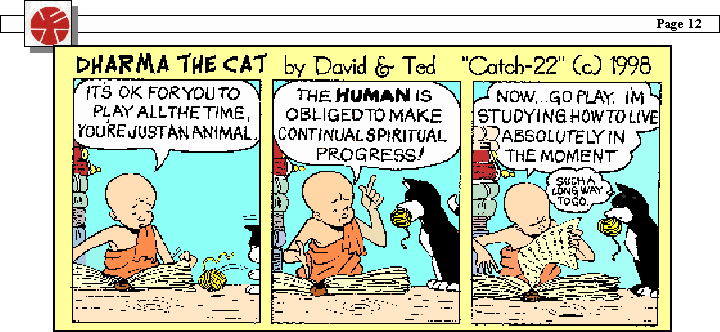|
|
 |
 |
|
|
|
|
AUTHOR'S COMMENTARY
DHARMA THE CAT: EPISODE 11 - "CATCH-22"
by David Lourie
The episode titled "Catch-22" raises several issues:
why does Bodhi think it's okay for animals to just play, while humans are obliged to "make spiritual progress?"
b) what do we mean by "spiritual progress?"
c) what does "living absolutely in the
moment" have to do with spiritual progress?
d) where does "study" fit in with this practice of
living in the moment?
e) are animals actually more "advanced" than humans are with
regard to living in the moment?
Here are my thoughts.
Why does Bodhi say it's okay for animals to just play, while humans are obliged to make "spiritual progress?" For two reasons. Firstly, in Buddhist thinking there are several Realms Of Rebirth which we could end up in, but only the Human Realm has any real potential for "spiritual progress." This is because spiritual progress is based on one's "karma" (intentional thought/speech/actions), and humans are obviously better equipped mentally than animals are, when it comes to forming intentions and ethical judgments. Therefore spiritual progress is an opportunity humans have which animals don't have. Thus Bodhi (like all Buddhists) feels obliged to utilize the opportunity -- not only for his own spiritual progress toward his own enlightenment, but also out of a sense of responsibility to the community, because each
person who makes spiritual growth raises the spiritual platform for the whole community, and can then help others make similar progress. Secondly, being born in the Human Realm is an extremely rare and fortunate event, and to a Buddhist it seems tragic and ill-advised to waste this precious opportunity. (See "The Rare Event Of Human Birth" by George Gatenby).
.B) what do we mean by "spiritual progress?" Webster's Dictionary defines "spiritual" as "pertaining to the spirit or soul . . . not material; unworldly; pertaining to sacred things; holy. . ." The Harper Collins Dictionary Of Religion defines spirituality only in a Christian context: "In
(Continued on page 13)
|
|
|
|
|
 |
 |
|
|

